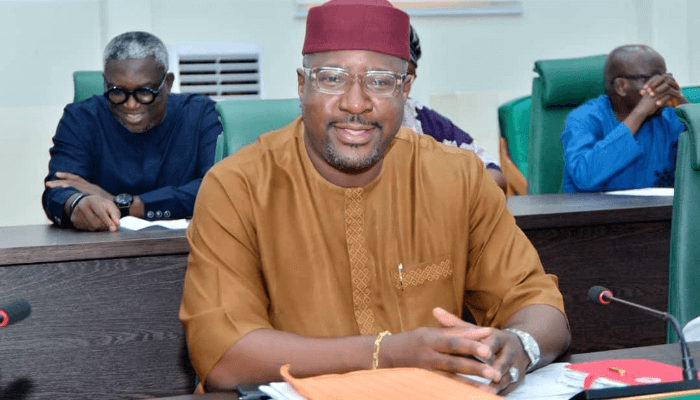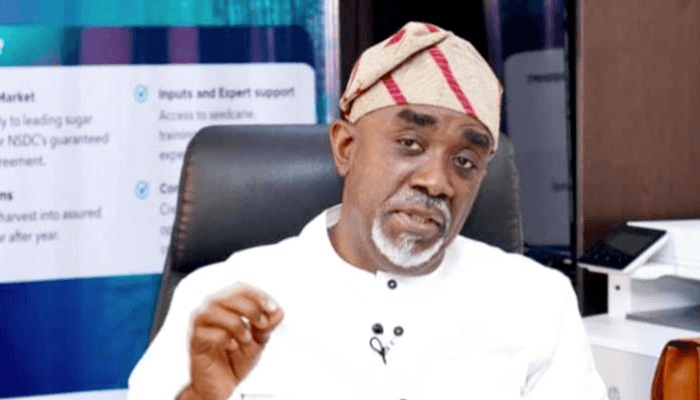Hussein Omon Mustapha Lecky is the Chief Whip of the Edo State House of Assembly, representing Etsako West Constituency I. He chairs the House Committee on Commerce and Industries and serves on key committees such as Health, Security, Agriculture and Food Security, and Women Affairs. In this interview with KENNETH ATHEKAME, he shared his plans to position Edo State as a key player in Nigeria’s economic landscape and discussed the bills and policies he is currently working on to enhance the ease of doing business in the state. Excepts:
As Chairman of the House Committee on Commerce and Industries, what is your long-term vision for Edo State’s industrial and commercial growth?
My long-term vision is for Edo State to become a hub of industrial and commercial excellence, a state where local industries thrive, trade flows seamlessly, and businesses of all sizes have the tools to succeed. I am committed to building a diversified economy that is both competitive and inclusive, creating opportunities for our youth, empowering women, and ensuring prosperity reaches every community. I am also working with my colleagues and the state government to not only attract investors, but also create an enabling environment for investors to thrive in the state. In the years ahead, I want Edo to stand as a national leader in sustainable growth and a driving force for shared economic progress in Nigeria.
How do you plan to position Edo State as a key player in Nigeria’s overall economic landscape?
I plan to capitalise on Edo State’s strategic geographic location by developing critical trade infrastructure and establishing specialised industrial clusters. My objective is to transform the state into a major logistics and trade gateway for the South-South region and Nigeria as a whole, thereby elevating its contribution to national GDP through targeted growth in agriculture, manufacturing, and technology. A practical example of this commitment is the recent partnership I facilitated between Edo State and Cap9Consulting, a global mining and natural resources firm. By attracting this collaboration, we have opened new opportunities in mining, job creation, and sustainable resource development. This kind of forward-looking partnership demonstrates how Edo state can position itself as a hub for both domestic and international investment.
What specific bills or policies are you currently working on to enhance the ease of doing business in Edo State?
The House Committee on Commerce and Industries is actively drafting legislation focused on a unified business registration system, the elimination of duplicative taxes, and the establishment of a public-private credit guarantee scheme for MSMEs. Furthermore, we are advancing a regulatory reform bill designed to streamline approval processes and institutionalise transparency across all commercial sector engagement with the government.
How will your committee ensure that existing commercial laws and regulations are aligned with global best practices?
The House Committee on Commerce and Industries is conducting a comprehensive review and gap analysis of our existing legal framework, setting a baseline against leading global economies. This process involves structured consultations with international trade bodies, legal experts, and development partners to ensure our laws are modern, competitive, and instill investor confidence.
What strategies are in place to curb bureaucratic bottlenecks that discourage investment in Edo State?
Our strategy is centered on process digitization, the implementation of a single-window system for approvals, and the establishment of clear service level agreements and accountability frameworks within ministries. The goal is to systematically eliminate redundancies and ensure predictable, timely service delivery for investors.
Which industries do you believe hold the greatest potential to drive economic transformation in Edo State?
Agriculture, technology, and manufacturing are our core pillars for transformative growth. My approach is sector-specific: Agriculture: Promoting large-scale agro-processing and integrated feedstock systems to move up the value chain. Technology: Establishing innovation hubs and enhancing ICT infrastructure to accelerate the growth of a digital economy. Manufacturing: Advocating for the development of enabling infrastructure for specialized industrial parks. This multi-sector strategy is designed to create a synergistic and resilient economic base.
How are you collaborating with stakeholders to attract local and foreign investors to Edo’s industrial sector?
I’m currently engaging in proactive diplomacy with investor groups, chambers of commerce, industry associations, and the Edo diaspora through the newly launched Diaspora Investment Desk. This involves organizing curated investment tours, guaranteeing policy consistency, and designing targeted incentives to de-risk investments and showcase Edo’s viable opportunities. At the same time, I am working with my colleagues in the House, alongside the state and federal governments, to create a more enabling environment for investors. We recognize challenges such as infrastructure gaps, power supply, and security concerns, but significant improvements are already being recorded, particularly in the area of security. To strengthen investor confidence further, I have been personally touring key MDAs with my committee to understand their operational challenges and ensure our legislative interventions are aligned with investor needs. While we are not yet where we aspire to be, our commitment remains firm: to make Edo State a secure, competitive, and attractive destination for investment.
What infrastructure gaps currently hinder commerce and industry in Edo State, and how is the House addressing them?
Like many growing economies, Edo still faces infrastructure gaps such as power supply, transport networks, and broadband access. Through ongoing legislative support and collaboration with stakeholders, efforts are being made to strengthen these areas so that commerce and industry can thrive.
Are there plans to establish industrial parks or special economic zones to support small and medium-scale enterprises (SMEs)?
Absolutely. The Committee is collaborating with the State Executive and private developers on plans for integrated industrial parks and Special Economic Zones (SEZs). These zones will provide SMEs with critical amenities, shared services, tax advantages, and streamlined regulatory oversight to enhance their competitiveness.
How do you plan to integrate youth entrepreneurship and skills training into Edo’s industrial growth agenda?
I’m already integrating innovation and skills training into the heart of our industrial strategy. This involves aligning educational curricula with industry demands, expanding technical and vocational programs, and supporting youth-led enterprises through targeted seed funding in emerging growth sectors.
What role can innovation and technology play in creating opportunities for Edo’s young population?
Technology allows our youth to compete in the global digital marketplace through fields like software development, fintech, and e-commerce. Our policy focus is on creating the infrastructure, digital literacy, high-speed internet, and innovation hubs that make this potential a reality. The government has been working closely with the Edo State ICT Agency and continues to do so to expand these opportunities and ensure our young people are fully equipped for the digital future.
How can public-private partnerships be leveraged to accelerate industrial growth in Edo State?
Public-private partnerships (PPPs) are a cornerstone of our strategy. The government’s role is to provide a stable policy environment and critical enabling infrastructure, while the private sector brings in capital, expertise, and operational efficiency. To give practical context, I sponsored and successfully passed the Edo State PublicPrivate Partnership (PPP) Bill, the first private member’s bill signed into law in this Assembly. This legislation creates a sustainable framework for PPPs, ensuring transparency, accountability, and investor confidence. It is through this kind of deliberate legislative action that we will accelerate industrial projects in logistics, power, ICT, and industrial park management.
What mechanisms are being explored to access funding from development agencies and investors for commerce-related projects?
The Committee on commerce and industries is strategically engaging multilateral development institutions World Bank, AfDB, DFIs, and private equity firms. Also, we are developing bankable project proposals and creating a transparent project pipeline to make Edo State an attractive destination for commercial and development funding.
How will you ensure that industrial growth does not harm the environment or displace local communities?
Sustainable and inclusive development is a non-negotiable principle. We are championing legislation that mandates Environmental Impact Assessments (EIAs), promotes green technologies, and requires community development agreements as a precondition for major industrial projects to ensure host communities are beneficiaries, not casualties, of growth.
What measures are being taken to include women and marginalised groups in Edo’s economic growth agenda?
I am committed to building an economy where no one is left behind. This involves creating targeted opportunities for women and marginalized groups through access to credit, capacity-building initiatives, and dedicated support for small enterprises. The Committee is also ensuring that their voices are represented in decision-making spaces, so policies reflect the realities of all our people. True progress can only be measured when growth is inclusive and every citizen has a fair chance to benefit.
How does the House Committee on Commerce and Industries plan to monitor the implementation of economic policies?
Monitoring implementation is just as important as passing good policies. As a committee, we are strengthening our oversight role by putting systems in place for regular progress reviews, requesting transparent reports from ministries and agencies, and engaging stakeholders through consultations and public hearings. This way, we not only track performance but also ensure that economic policies deliver tangible benefits to the people of Edo State.
What role will transparency and stakeholder engagement play in ensuring policies achieve their intended impact?
Transparency and engagement are fundamental to effective governance. We are committed to a policy-making process that is consultative. Actively incorporating feedback from civil society, private sector actors, and communities. This ensures policies are practical, widely understood, and enjoy the broad support necessary for successful execution.
How has your background in technology, education, and public service influence your approach to developing Edo State’s commercial sector?
My background provides a multidisciplinary lens. From technology, I apply a focus on efficiency and innovation. From education, a deep understanding that human capital is our greatest asset. And from public service, the unwavering principle that our mandate is to serve the public interest with accountability. This combination shapes a strategy that is modern, people-centric, and results oriented.
Looking ahead, what legacy do you hope to leave in terms of commerce and industrial growth in Edo State?
The legacy I hope to leave is one where Edo’s growth is not only measured in numbers, but in the lives it has touched. I want to be remembered for helping to build an economy where young people can dream and find opportunities at home, where women and marginalized groups are empowered to thrive, and where farmers and entrepreneurs alike can prosper. My vision is that the foundation we lay today will continue to drive inclusive industrial growth for decades, making Edo a model of shared prosperity and sustainable development in Nigeria? The House Committee on Commerce and Industries is conducting a comprehensive review and gap analysis of our existing legal framework, setting a baseline against leading global economies. This process involves structured consultations with international trade bodies, legal experts, and development partners to ensure our laws are modern, competitive, and instill investor confidence.











